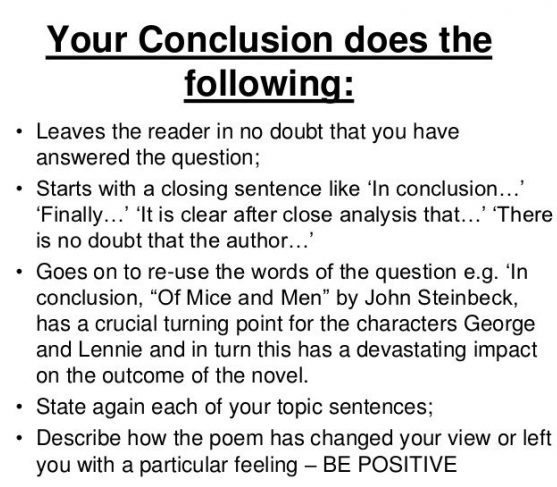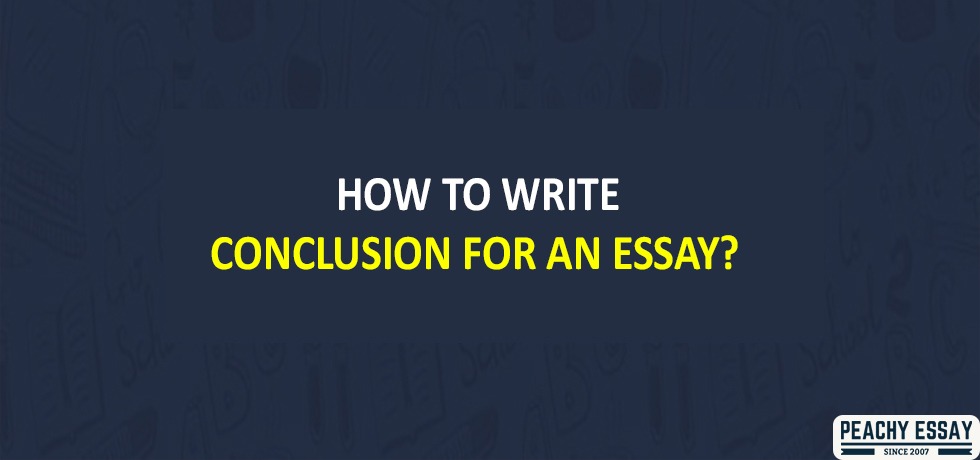There is so much at stake when writing a conclusion to an essay. Because this is, after all, your last chance to convince your readers/professors to accept your point of view, to impress them as a good writer and a fast thinker. The impression you create in your conclusion will shape the impression that stays with your readers after they’ve finished the essay. This will in turn shape the score you’ll get if it is an essay to be graded. Easy custom essay writing does not exist; you must follow the rules rigorously if you wish to come up with a proficient piece. The smartest decision, however, would be to give out such essays to writers like Peachy Essay who are professionals in the art of writing.
The Importance of an Essay
On different occasions in life, we would have causes to write essays. As the adage says, “whatever your hand finds to do, do it well”. Students particularly cannot avoid having to write essays. Essays contribute a huge quota to a student’s overall performance in a course. There are other times we have to write essays for scholarship applications or contests. Sadly enough, many students are ignorant of this fact and they often pay for this ignorance with the marks they have labored so hard for. Since essays contribute so much to your eventual grade in a course, you have to start taking them seriously. They count so much. Since you’re going to be writing a lot of essays as a student, why not learn to do it right?
What is an Essay?
The word “Essay” derives its origin from the Latin word “exagium” which means to present one’s case. “Essay” has been defined by Merriam Webster’s Learners Dictionary as “a short piece of writing that tells a person’s thoughts or opinions about a subject”.
How Important Is A Conclusion In An Essay?
If you are going to be writing an essay, there MUST be a conclusion. If you don’t intend to write a conclusion, then do not bother writing the essay at all, it is that important. Every essay must have an introduction, the body (content or points), and a conclusion. You cannot skip any of these three steps. Since it becomes very important that every essay must contain a conclusion, then it is subsequently very important that you give your essay a befitting conclusion/ending. It is often said that “the end of a thing is better than the beginning”. At Peachy Essay, due to the experience of our expert writers as ex-professors and lecturers, it is all too easy for our writers to wrte my essay for you and to finish it off with a grand conclusion.
It is important to have a very good conclusion in your essay because oftentimes, the professor may be too busy to read through your entire essay write up. What he/she would do on such occasion is to check out your conclusion and award you the mark which befits the proficiency of your conclusion. If you forget anything, never forget that the conclusion of an essay is an important task you must take seriously in your essay writing.
What Is The Purpose Of An Essay Conclusion?
The purpose of having a conclusion in an essay may further prove to you why Academics see it as crucial all over the world. Before we consider helpful tips in writing a good conclusion, you should note that your conclusion is aimed at restarting your most powerful arguments which you raised in the body of the essay in a concise, brief way. The purpose of every conclusion in an essay is as follows:
- It is meant to leave a good impression with the reader after reading it
- It is aimed at proving your thesis
- It is the last attempt at striking the point, hence, the last attempt at earning good marks
- It is the fulfillment of promises made at the introductory stage
- It is aimed at giving the reader the impression of a wholesome, complete piece of writing.

7 TIPS ON HOW TO WRITE CONCLUSION FOR AN ESSAY
The structure of the conclusion of your essay should be simple; containing striking sentences, clear and concise language. Having considered how important it is for you to have a conclusion in an essay, let us proceed to consider 7 tips on how to end an essay in an immaculate way. They are:
- Restate Your thesis
- Summarize The Main Points
- Do Not Write New Ideas
- Brevity is Key!
- Make It Catchy!
- Use The Irony; Do Not Conclude
- Connect Your Conclusion With Your Introduction; Use It As A Guide
-
Restate Your Thesis
Looking for how to start your essay? Then start by restating your thesis statement in a way different from how you did at the introductory stage. An important task you must fulfill when writing your conclusion in an essay is to try to restate your thesis in a simple, clear way. Your thesis is that statement or theory that you have put forward in your introduction which you intend to prove. Chances are if your reader does not understand your thesis, it is most probable that he/she wouldn’t see how you proved your thesis. How could you have proved that which he/she doesn’t understand? You would have simply wasted your time and effort. In order to make sure you have the best thesis statement, you can check out our free thesis statement generator tool.
To avoid such a bad occurrence which can produce discouraging results or scores, it is important you employ simple, concise, clear language in expressing your thesis once again in your concluding paragraph.
-
Summarize The Main Points
Another important endeavor you must engage in when writing your conclusion is that you must summarize all the crucial points which you have raised in the body of the essay. Remember we said earlier that there are times your reader(s) may be too busy to read your entire essay? Summarizing your points in your conclusion therefore becomes very useful on such occasions.
Summarizing your points has techniques. The best technique is to arrange your points from the strongest to the weakest. This means that you get the main idea from each paragraph that makes up the body and decide their scale of importance. When you do this, it increases your chances of leaving a good impression with a reader that isn’t ready to read through everything. If your present weak arguments first, the reader may get bored and judge your essay on the basis of the weak arguments he/she come across first without reading further. Presenting strong points first, therefore, sustains the attention and interest of the reader.
-
Do Not Write New Ideas
One factor that can ruin ending an essay fluidly is by introducing a new point or idea. NEVER introduce a new point in your conclusion. Any and every point which you intend to discuss in relation to the central subject matter must be raised with the body section. As the name implies, “conclusions” are meant to sum up or give finishing to a piece of writing.
Why should you not write new ideas in your conclusion? You shouldn’t write new ideas in your conclusion because you would have defeated the purpose of the concluding section. Since your conclusion is supposed to be as short as possible, raising new points would require you to explain the points at length, hence, prolonging the length of your conclusion.

-
Brevity Is Key!
When the body of your essay and your conclusion are of the same length, what then is the difference between the two sections? They should rather be considered the same. This implies that your essay has no conclusion and that would simply be terrible!
Brevity is the key to every conclusion. The reader may skip the reading of the body of the essay due to time constraints, but he/she would definitely read your conclusion since it is assumed to be a summation of the body and introduction. Who would want to read an essay and by extension, a conclusion that is as bulky as the telephone directory?
To achieve brevity in your conclusion, use non-ambiguous, concise, simple sentences and expressions that hits the nail on the head. You do not need to explain your points in detail; two sentences should be enough for each point. All you need is one or two sentences that show that you have proved your thesis. If your reader needs more information on any of the points, he/she would simply have to scroll up to the paragraph in which such a point has been fully discussed.
-
Make It Catchy!
There is the possibility that your reader has been surfing through your essay and he/she is already beginning to get bored. Why make him or her get even more bored through your conclusion? If a professor reads your essay and gets bored, you can be certain that the score you’ll get wouldn’t liven up your mood. It is more of garbage in, garbage out. Remember that your conclusion in every essay is your last chance to create a good impression in the mind of the reader?
How to start a conclusion of an essay therefore is to make it catchy. You can do this by posing an interesting rhetorical question, by quoting a notable authority from the field of the subject you’re writing on, or by showing the consequences of the negation of your thesis. Do anything you can to ensure it is catchy enough to grab and sustain the attention of the reader and creates a good lasting impression even after reading the essay. Whatever you do, however, do not contradict your main argument.
-
Use The Irony; Do Not Conclude
You may be wondering what this means. We intend to write a conclusion, but the actual irony is not to conclude! While you may have conducted extensive research and must have tried your best at giving your essay an objective result, nevertheless, do not conclude on the result. Ask yourself these questions:
First of all, does your conclusion completely depict the final, unwavering conviction you have with regards to the subject matter? Is there a possibility that there exists a material you were unaware of or which is inaccessible to you at the time of composing the essay and of which this material can give fresh and a differing perspective to the issue being discussed? Can’t there be even a 0.0001% chance that you may have made a mistake at some point in the research process? Do not take a decisive closure in your conclusion. This is why it is not advisable to start a conclusion with the “conclusively”. It connotes a sense of finality, an end to doubt. Your essay most probably wouldn’t resolve a dispute totally; it is meant to clarify your stand on the issue.
Hence, the purpose of a conclusion in an essay isn’t to give a final authoritative stand, but it is to express the conclusion of your opinion on the issue at hand.
-
Connect Your Conclusion With Your Introduction
A good way to end the conclusion of an essay is to connect the last statement(s) with those made in the introductory section. Such a statement must connect the reader back to the introduction of the essay such that there will be a sense of coherence and cohesion. The beginning must be well tied to the end. Leave no loose ends. Ensure that the question you promised to answer in the introduction has been answered. Leave no promises unfulfilled. Ensure that whatever framework, methodology, or goal(s) you promised to achieve at the introductory stage has been achieved.
Before you log off, even if you forget anything, remember to ALWAYS write a conclusion in your essay. It is crucial to the overall success of your essay. You may be tempted to ask that “in which paragraph does the writer provide insightful reflection? You can do this in the body of your essay through the points you raise. However, for experts such as those at Peachy Essay with its best-in-class essay services, the concluding paragraph is a pivotal, well-timed place to give insightful reflections. This can be done by simply posing an obvious rhetorical question or by simply stating the implications of a negation of the points raised so far. Several essay conclusion examples are available at Peachy Essay; the home of essays.
When one considers the intricacies that go into composing a beautiful essay having a killer conclusion, the smartest choice would be to give out your essay writings to Professional Writers who live to do this. And where else can you get the best if not at Peachy Essay?


